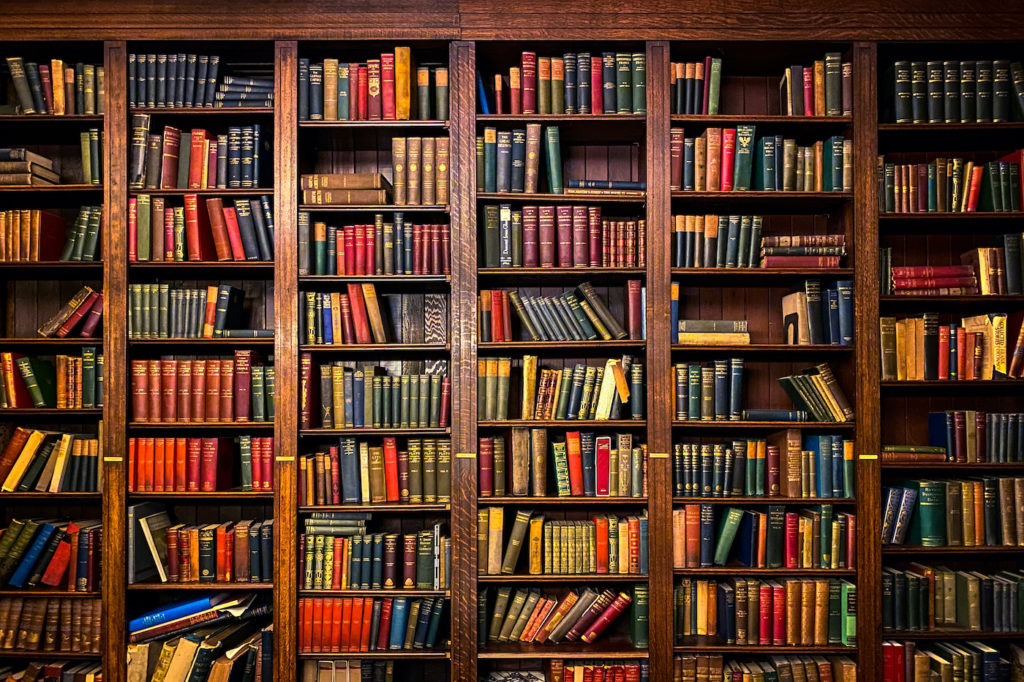Recently undergoing a kind of semi-retirement that requires me to find room in my home for the books I kept in my office, I have had to start facing up to the prospect of reducing the number of books I own. I have ordered some nice new bookcases to shelve them—adding yet again to the linear feet of wall space devoted to books in our home—but it will still be necessary to cull the combined library if I don’t want my long-suffering wife (who, to be fair, owns some of the books herself) to have to navigate around stacks of books on the floor.
The prospect is painful but not unprecedented. When we made a long-distance move about a decade ago, we got rid of our obsolete academic textbooks and what I called our “ephemeral fiction”—the novels you read once but don’t foresee rereading. Now, however, more drastic measures may be called for. Not that I need to be rid of a great many books, but I do need to make some choices.
One principle of choice I will pursue to some extent is a preference for primary over secondary works. Thomas Hobbes can stay, but a clutch of scholarly treatments of Hobbes? Maybe not, though one or two may seem indispensable. And of mediocre books on constitutional law (the commonest kind there is) I probably have far too many.
Reflections like these turned my mind toward publishers that seem to be of high value because of the enduring importance of their books. One such is Liberty Fund, which specializes in classic conservative and libertarian texts in politics and economics—sometimes resurrecting books that once were important and deserve another look but have been long unavailable. LF’s production standards are extraordinarily high—even its paperbacks are handsome books with sewn bindings—and its prices are low. These books are keepers.
Start your day with Public Discourse
Sign up and get our daily essays sent straight to your inbox.So too the Library of America puts out a high-quality product. Though its paperbacks are nothing special, its hardcover books are beautifully designed, with thin but opaque paper, sewn bindings, cloth covers, and ribbon markers, in either uniform dustjackets or slipcases. The books are a pleasure to own and to read. Unlike LF, LoA has a broad mission to publish (in its own words) “America’s greatest writing.” The only certain criterion for inclusion is that the authors be Americans, by birth or immigration—but they can be poets, novelists, playwrights, cultural commentators, journalists, historians, or statesmen and political figures. (Understandably and quite forgivably, LoA violated its rule on American nationality by including Tocqueville, apparently the only foreign exception.)
Looking at my several feet’s worth of LoA volumes has led me to wonder how a writer gains entry into the canon of “America’s greatest writing.” Some LoA authors are perfectly obvious—Cooper, Hawthorne, Melville, and Twain in the nineteenth century; Faulkner, Fitzgerald, Cather, and O’Connor (Flannery, not Edwin) in the twentieth. But then there are some interesting omissions. Only a year ago, for instance, did LoA get around to its first volume of Hemingway. Until then I wondered whether his star had fallen below that of, say, Frank Norris (to choose a less well-known LoA novelist at random). Wendell Berry is in (most but not quite all of LoA’s authors have been deceased), but surely Walker Percy is worth considering as well. And why not Edwin O’Connor, come to think of it?
I have no inside knowledge of what books LoA’s editors plan for future publication. But on the off chance that they might not be thinking of them, I have a few more suggestions. All of these are writers whose works fulfill LoA’s criteria as “acknowledged classics, neglected masterpieces, [or] historically important documents and texts.” All of them are volumes I would happily add even to my downsized library.
LoA has done admirably well, I think, in including leading black authors, in poetry, fiction, and nonfiction. But alongside Sojourner Truth, Frederick Douglass, W. E. B. Du Bois, and Zora Neale Hurston, the omission so far of a volume of Booker T. Washington’s writings is striking. As a more “conservative” counterpart to his younger contemporary Du Bois, Washington was an acknowledged leader in the black community and in the nation’s life, and his writing retains great power to this day. If he has been considered and ruled out because his politics do not seem radical enough—a charge he faced in his own day—then his omission is an ideological scandal. He should be in—and Diana Schaub of Loyola University in Baltimore should edit a volume of his works.
Historians are very meagerly represented in the Library of America. One might count Du Bois in this category, but otherwise there are just four that I can see: Henry Adams, Francis Parkman, Richard Hofstadter, and Barbara Tuchman. The inclusion of the last is interesting: Tuchman was a popular and vivid writer but had no real purchase on the profession of history. For twentieth-century historians with lasting influence, LoA should consider Charles A. Beard, J. Allen Smith, and Vernon Parrington. All were left of center, to be sure, but every one of them had a large impact on the study of our country. Or the editors might consider Bernard DeVoto, Daniel Boorstin, or Christopher Lasch.
The works of these writers I suggest fulfill the Library of America’s criteria as “acknowledged classics, neglected masterpieces, or historically important documents and texts.” All of them are volumes I would happily add even to my downsized library.
Among statesmen, the founding generation is well covered, with Franklin, Paine, Jefferson, Washington, Adams, Hamilton, Madison, and Marshall. For the nineteenth century Lincoln is in, of course, as are the memoirs of Grant and Sherman, and rightly so. But the only twentieth century political leader included is Theodore Roosevelt. The most obvious choice for an additional writer here is Woodrow Wilson. One may regard his politics as reprehensible and his influence as malign—having taught a course on Wilson last spring, I sympathize—but his achievements were large and his impact still larger, with notable works on the American constitutional order and his country’s history, as well as many articles, lectures, and speeches.
LoA has just one economist, John Kenneth Galbraith. Where is Milton Friedman or Thomas Sowell? For journalists and commentators on politics and culture, LoA includes H. L. Mencken, Reinhold Niebuhr, and Edmund Wilson. But major voices such as Walter Lippmann and William F. Buckley, Jr. are also worth including.
Given the breadth of the Library of America and its continual addition of new volumes, one hesitates to say that the editors are closing their American canon to alternative voices, particularly more conservative ones; I have suggested some missing left-leaning authors myself. Indeed, some of the choices LoA has made seem frankly idiosyncratic and personal on the part of the editors—three or four fantasy and science fiction authors, for instance, and some multi-author SF anthologies, while many other obvious possibilities for single-author volumes are neglected. But I strongly urge LoA’s decision makers to try some new paths to different hilltops, and take in other vistas than they have so far done.














